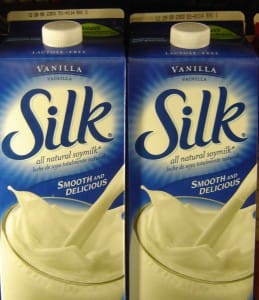[Note from Mark Kastel: Since Dean Foods purchased the Silk product line they took a company that was 100% organic and switched it to virtually 100% conventional ingredients for their soy, almond, coconut and other “plant-based beverages.” They even experimented with a non-organic yogurt, aimed specifically at toddlers with their Horizon products (including conventional fruits and vegetables on the dirty dozen list!). Although WhiteWave has recently been spun-off from the nation’s largest dairy conglomerate, Dean Foods, their DNA has not changed much. The major investors that own Dean Foods stock now own most of WhiteWave. The executives, including the former CEO at Dean Foods, are now running WhiteWave. This is how you make real money in America: on Wall Street.]
DenverPost.com
By Alicia Wallace, Daily Camera
 WhiteWave Foods, the Broomfield-based, $2.3 billion operator of Horizon Organic and Silk soy milk that recently was spun off by Dean Foods Co., was founded with a $500 loan. In 1977, Steve Demos took those funds and started White Wave Inc., a vegetarian-food company specializing in tofu products.
WhiteWave Foods, the Broomfield-based, $2.3 billion operator of Horizon Organic and Silk soy milk that recently was spun off by Dean Foods Co., was founded with a $500 loan. In 1977, Steve Demos took those funds and started White Wave Inc., a vegetarian-food company specializing in tofu products.
The Daily Camera connected with Demos on Thursday after Dean Foods completed its spinoff of WhiteWave Foods.
Demos was traveling, but he responded to questions via e-mail.
The following has been edited for clarity and space.
Q: What involvement/ownership stake, if any, do you have in WhiteWave Foods now?
A: I have no personal investment or connection to WhiteWave Foods or Dean Foods.
Q: From your perspective, what could both the recent initial public offering and spinoff mean for the company and the natural/organic industry?
A: The IPO gives the company the freedom as a stand-alone entity to carve out its own destiny without the shadow of a parent company. When the parent company is a commodity business and the subsidiary is a value-creation business, the business practices and the business cultures will be different. Separating these two is sound.
Now that WWF is public, there is one more potent and powerful natural-foods player on the main financial/performance stage. Considering that organic foods (and soy in particular) were the target of many jokes years ago, this is a big signal that the mainstream has embraced these lifestyle choices in a very serious way.
Small business might be beautiful, but it is rarely impactful on a large society level. Large business has the opportunity, maybe the moral responsibility, to lead positive change in society.
For instance, WhiteWave Foods’ taking the lead in the fight to rid Boulder of GMOs (genetically modified organisms) on open space says to the world that the company stands for something important to the community and not just for the welfare of its stockholders.
Q: Since Dean acquired WhiteWave, do you feel the company you founded grew in a meaningful way?
A: Grew in a meaningful way is a perspective question. From the perspective of the business, revenue and profits, I don’t know, but have heard the company has done very well. As my attachment is Silk, I understand that it is in the neighborhood of double where it was when I left. That’s not “on fire growth,” but it is very meaningful in propelling the brand towards a billion dollars in sales per year.
From the social-responsibility side, the growth has been questionable. There have been some significant changes to the “authenticity” of what was once the largest organic brand in the (United States).
Q: What, if anything, would you have done differently — either from your executive role with the company or watching it from the sidelines?
A: I would have maintained the flagship products as pure 100 percent organic, GMO-free. I would connect the consumers’ loyalty to the brand by having the company stand up for those social issues that are important to the consumer and not just the operations and profits of the company.
It is easy for me to sideline coach, but my passion was, and is, “Right Livelihood.” Frankly speaking, I would have done nothing differently than Pat Calhoun and I did for the 28 years we guided White Wave … innovate, guide and give back.
Q: What are your expectations for WhiteWave moving forward?
A: I suspect that the lessons of the past few years in connecting or alienating their core consumer and market will teach them the best path for their business. I expect the brand to join the rare circle of $1 billion per year companies.
It’s a great product, and the world is better off with it.
Read The Denver Post’s Terms of Use of its content: http://www.denverpost.com/termsofuse
Follow us: @Denverpost on Twitter | Denverpost on Facebook

